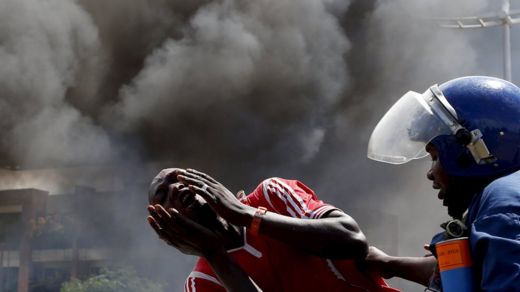Image captionGen Athanase Kararuza was attacked by heavily armed men while he was driving
A security advisor to Burundi's vice-president has been shot dead while dropping off his daughter at school.
General Athanase Kararuza and his wife died instantly, while their daughter was injured. No group has said it was behind the attack in the capital.
More than 400 people have been killed in unrest since President Pierre Nkurunziza said he would run for a third term last April.
A string of high-ranking army officials have been targeted during the conflict.
Security forces have also been accused of killing opponents and dumping them in mass graves by rights group Amnesty International.
Shortly after the attack in Bujumbura, the International Criminal court announced that it was starting a preliminary investigation into the violence in Burundi.
This will decide whether a full-blown investigation will take place, which could result in charges against those accused of being behind the violence.
BBC Great Lakes reporter Robert Misigaro says the killing is a blow for President Nkurunziza because it shows that he cannot guarantee the safety of his officers.
On Sunday the Minister for Human Rights Martin Nivyabandi survived a grenade attack as he was coming out of church.
Although both opposition and government forces are ethnically mixed, some fear that the violence could descend into a repeat of the genocidal killings which the country has previously experienced.
President Nkurunziza is the former leader of a Hutu rebel group which battled a Tutsi-dominated army for many years until he came to power in 2005 as part of a peace deal.
The African Union had said it would send a 5,000-strong peacekeeping force to the country even if the government did not accept it but it has since back-tracked.
Timeline: Chaos in Burundi - BBC

Image copyright: ReutersImage caption
Burundi saw violent unrest after Mr Nkurunziza announced he would pursue a third term
April 2015: Protests erupt after President Pierre Nkurunziza announces he will seek a third term in office
May 2015: Constitutional court backs Mr Nkurunziza's bid. Tens of thousands flee as demonstrations continue
May 2015: Army officers launch a coup attempt, which fails
July 2015: Elections are held, with Mr Nkurunziza re-elected. The polls are disputed, with opposition leader Agathon Rwasa describing them as "a joke"
December 2015: 87 people killed on one day as soldiers respond to an attack on military sites in Bujumbura
January 2016: Allegations emerge of mass graves and gang-rapes by Burundian security forces
April 2016: The UN approves a resolution paving the way for a UN police force to be deployed in Burundi
A security advisor to Burundi's vice-president has been shot dead while dropping off his daughter at school.
General Athanase Kararuza and his wife died instantly, while their daughter was injured. No group has said it was behind the attack in the capital.
More than 400 people have been killed in unrest since President Pierre Nkurunziza said he would run for a third term last April.
A string of high-ranking army officials have been targeted during the conflict.
Security forces have also been accused of killing opponents and dumping them in mass graves by rights group Amnesty International.
Shortly after the attack in Bujumbura, the International Criminal court announced that it was starting a preliminary investigation into the violence in Burundi.
This will decide whether a full-blown investigation will take place, which could result in charges against those accused of being behind the violence.
BBC Great Lakes reporter Robert Misigaro says the killing is a blow for President Nkurunziza because it shows that he cannot guarantee the safety of his officers.
On Sunday the Minister for Human Rights Martin Nivyabandi survived a grenade attack as he was coming out of church.
Although both opposition and government forces are ethnically mixed, some fear that the violence could descend into a repeat of the genocidal killings which the country has previously experienced.
President Nkurunziza is the former leader of a Hutu rebel group which battled a Tutsi-dominated army for many years until he came to power in 2005 as part of a peace deal.
The African Union had said it would send a 5,000-strong peacekeeping force to the country even if the government did not accept it but it has since back-tracked.
Timeline: Chaos in Burundi - BBC

Image copyright: ReutersImage caption
Burundi saw violent unrest after Mr Nkurunziza announced he would pursue a third term
April 2015: Protests erupt after President Pierre Nkurunziza announces he will seek a third term in office
May 2015: Constitutional court backs Mr Nkurunziza's bid. Tens of thousands flee as demonstrations continue
May 2015: Army officers launch a coup attempt, which fails
July 2015: Elections are held, with Mr Nkurunziza re-elected. The polls are disputed, with opposition leader Agathon Rwasa describing them as "a joke"
December 2015: 87 people killed on one day as soldiers respond to an attack on military sites in Bujumbura
January 2016: Allegations emerge of mass graves and gang-rapes by Burundian security forces
April 2016: The UN approves a resolution paving the way for a UN police force to be deployed in Burundi




